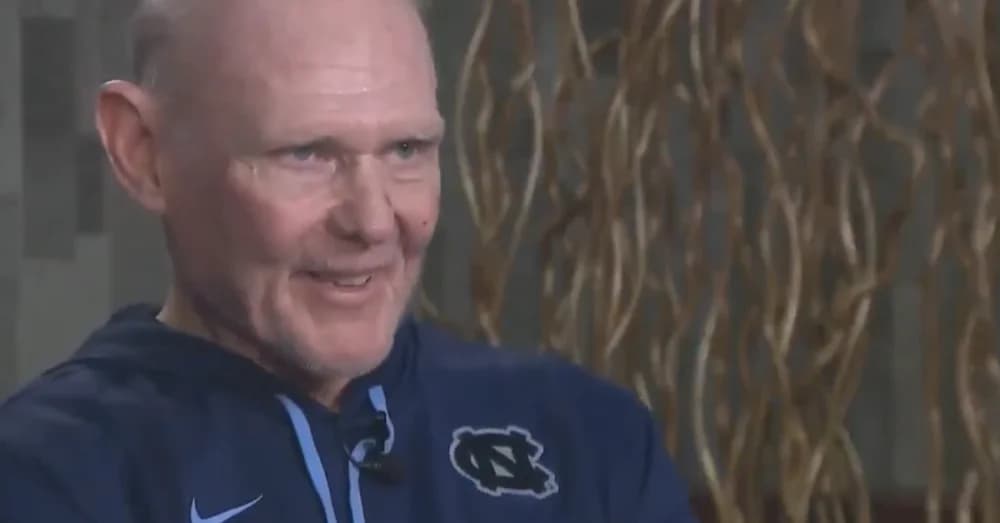George Karl Sparks Controversy with Mount Rushmore of Basketball Snub: A Deep Dive

In the ever-evolving debate over basketball’s greatest players, former NBA coach George Karl has stirred the pot once again. On Wednesday, George Karl took to X, formerly known as Twitter, to question a fan-made Mount Rushmore list of basketball legends. The list featured Michael Jordan, Kobe Bryant, LeBron James, and Stephen Curry, but conspicuously omitted several earlier influential players. Karl’s post read, “Did pro hoops start in 1985?! 🤔😆,” igniting a firestorm of reactions from fans and pundits alike.
Did pro hoops start in 1985?! 🤔😆 https://t.co/rCwuRSG11n
— George Karl (@CoachKarl22) July 25, 2024
Karl’s tweet seemed to highlight a glaring oversight in the list: the absence of players who shaped the game long before the 1980s. Given Karl’s extensive career in the league, both as a player and a coach, his perspective carries significant weight. Drafted in the fourth round of the 1973 NBA draft, George Karl played for the San Antonio Spurs for five years before transitioning into coaching. His journey from the courts to the sidelines includes a notable stint as head coach of the Montana Golden Nuggets in the Continental Basketball Association (CBA), where he led the team to two championships in 1981 and 1983, earning Coach of the Year honors both times.
Karl’s NBA coaching career spans over 27 years with six different franchises, including the Cleveland Cavaliers, Golden State Warriors, Seattle Supersonics, Milwaukee Bucks, Denver Nuggets, and Sacramento Kings. Despite never winning an NBA championship, Karl’s teams made the postseason 22 times, including a memorable trip to the 1996 NBA Finals with the Supersonics. He was also named NBA Coach of the Year for the 2012-13 season with the Nuggets and is one of only nine coaches in NBA history to have won over 1,000 games.
The controversy surrounding Karl’s tweet is multifaceted. On one hand, it raises questions about the criteria for selecting the most influential players in basketball history. Are we focusing solely on modern-day stars, or should we also honor the pioneers who laid the groundwork for today’s game? Legends like Bill Russell, Wilt Chamberlain, and Kareem Abdul-Jabbar are often cited as foundational figures whose contributions to the sport were monumental.
Karl’s comment, “Did pro hoops start in 1985?!” points to a perceived generational bias in the list. The mid-80s marked the beginning of a new era in the NBA, with Magic Johnson and Larry Bird revitalizing the league, and Michael Jordan emerging as the global face of basketball. However, the game’s history stretches back much further, and figures from earlier eras are integral to its evolution.
Adding fuel to the fire, Karl’s reaction came on the heels of another significant announcement: LeBron James being named Team USA’s male flagbearer for the 2024 Paris Olympics. Karl, who has never been shy about expressing his admiration for James, praised the decision on X, writing, “Well deserved! 💪”. This honor makes James the first men’s basketball player to receive the flagbearer distinction in U.S. history, underscoring his monumental impact on and off the court.
Well deserved ! 💪🇺🇸 https://t.co/3zsNnpM1gq
— George Karl (@CoachKarl22) July 22, 2024
Lebron James, a four-time NBA champion and two-time Olympic gold medalist, will lead Team USA’s opening ceremony march in Paris, marking his fourth Olympic appearance in his 21-year career. His selection as flagbearer is a testament to his enduring influence and leadership in the sport.
The juxtaposition of Karl’s critique of the Mount Rushmore list and his praise for James highlights the complexity of evaluating basketball greatness. While contemporary stars like James and Curry have undeniably transformed the game, acknowledging the contributions of past legends is equally important. The debate over who belongs on basketball’s Mount Rushmore is a microcosm of the broader conversation about how we honor and remember the history of sports.
In conclusion, George Karl’s provocative tweet has reignited discussions about basketball’s greatest players, emphasizing the need to balance recognition between current icons and historical trailblazers. As fans and analysts weigh in, the dialogue continues to evolve, reflecting the rich and diverse legacy of the sport. The forthcoming Paris Olympics, with LeBron James at the forefront, promises to add yet another chapter to this ongoing narrative, blending past achievements with present triumphs.





